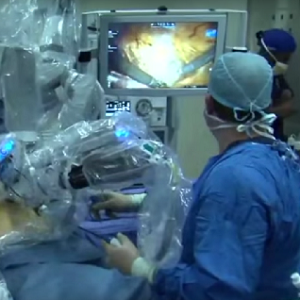
Tiny little 8mm robotic arms lift pieces of tissue, and an equally tiny pair of surgical scissors snips delicately… this is a video of a new robot, the Da Vinci robot, at work deep inside a human body.
Urologist and specialist in laparoscopic and robotic surgery, Dr Marius Conradie uses the Da Vinci to tackle cases of prostate cancer. Devices attached to his fingers guide the minuscule surgical instruments and achieve an unparalleled accuracy in removing prostate cancer – without damaging the nerve and the muscle which are an intimate part of continence and potency in men.
Watch Dr. Marius Conradie talk about robotic-assisted prostate cancer surgery:
At the same conference where Dr Conradie presented to delegates, the African Innovator magazine’s Round Tables Healthcare Innovation Summit, held in Johannesburg on 19 August, assistant professor Dr Imoh Okon from the Institute of Biomedical Sciences in Atlanta, USA, spoke to an enthralled audience about other technological advances which are changing the world of oncology – the study, diagnosis and treatment of cancer.
Dr Okon himself has been part of developing groundbreaking technology, a cancer diagnostic "drug resistance" test kit.
Possibilities opened up by technology
Chemotherapy and other cancer treatments often need to be administered over many months in many cancer cases. At first it is very effective and the tumour growth slows and shrinks; then, sometimes as early as six months in, the benefits cease. The tumours stop shrinking and start to grow again. This resistance is preceded by certain changes to biomarkers which can be measured by this very sensitive biotechnology-driven test kit, using blood or tissue samples. If an oncologist has advance warning of the development of resistance, he or she can change the therapy regime and avoid regression.
Dr Okon pointed out that the whole field of oncology is being driven by the possibilities opened up by technology. One rapid advance affects the field of imaging – how oncologists "see" tumours inside the body. Excellent imaging technologies – and a wide range of different ways of imaging – now mean that oncologists can build highly sensitive and detailed pictures of tumours in situ. “We can use multiple platforms to get more data in real time,” he noted.
These advances are not confined to very expensive equipment (the Da Vinci costs R22 million) that is installed in big facilities. Equipment like the handheld Vscan makes it possible for medical practitioners in far-flung rural clinics to achieve excellent imaging.
To make the best use of technological advances in the complex field of oncology, Dr Okon called for collaboration across many disciplines in Africa – between pharmaceutical companies, academia, computing and engineering – to drive medical innovations and product development attuned to the continent’s needs.
Read more:
Immunotherapy promises turnaround in cancer cure rates
CyberKnife – a new treatment for cancer patients
Afrikaners more likely to carry Angelina Jolie's breast cancer gene




 Publications
Publications
 Partners
Partners















